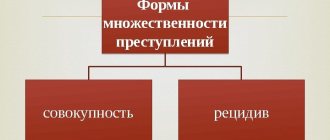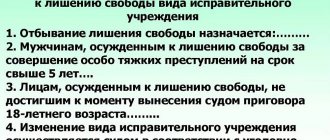New edition of Art. 68 of the Criminal Code of the Russian Federation
1. When assigning punishment for a recidivism, dangerous recidivism or especially dangerous recidivism of crimes, the nature and degree of public danger of previously committed crimes, the circumstances due to which the corrective effect of the previous punishment turned out to be insufficient, as well as the nature and degree of public danger of newly committed crimes are taken into account.
2. The term of punishment for any type of recidivism of crimes cannot be less than one third of the maximum term of the most severe type of punishment provided for the crime committed, but within the sanction of the relevant article of the Special Part of this Code.
3. In case of any type of recidivism of crimes, if the court has established mitigating circumstances provided for in Article 61 of this Code, the term of punishment may be assigned less than one third of the maximum term of the most severe type of punishment provided for the crime committed, but within the sanction of the relevant article of the Special Part of this Code Code, and in the presence of exceptional circumstances provided for in Article 64 of this Code, a more lenient punishment than provided for this crime may be imposed.
Commentary on Article 68 of the Criminal Code of the Russian Federation
1. In accordance with Part 5 of Art. 18 recidivism of crimes entails a more severe punishment on the basis and within the limits established by the Criminal Code of the Russian Federation. The commented article specifies these provisions, providing additional criteria for selecting punishment in case of recidivism: a) the number of previously committed crimes; b) the nature and degree of their public danger; c) circumstances due to which the corrective effect of the previous punishment turned out to be insufficient; d) the nature and degree of public danger of newly committed crimes.
2. On the concept of the nature and degree of social danger of a crime, see commentary. to part 3 art. 60. Since the content of the first additional criterion for sentencing covers the severity of previously committed crimes, it is necessary to establish for what crimes the person was previously convicted (under what article the acts were classified), what punishment was sentenced to (type, terms or amounts), and in case of multiple crimes - whether they were identical, homogeneous or heterogeneous. The age at which these crimes were committed and the perpetrator was convicted is also important. In particular, by virtue of Part 4 of Art. 18 previous convictions for crimes of minor gravity, either suspended or with a suspended sentence, as well as for crimes committed by a person under the age of 18, as well as expunged and expunged convictions, are not taken into account when recognizing a recidivism of crimes, and therefore, in such a situation, the provisions of the commentary . Articles do not apply at all.
3. Finding out the circumstances due to which the previous corrective action turned out to be ineffective is important in terms of predicting the further behavior of the convicted person and determining the sufficiency of the chosen punishment as a means of achieving its goals (correction, prevention of new crimes and restoration of social justice). This means the availability of data on the measures and duration of correctional and educational influence applied by the relevant body for the execution of punishment, on the response to these measures on the part of the convicted person, etc.
4. Taking into account the nature and extent of newly committed crimes is necessary in two respects. Firstly, to determine the punishment for the crimes themselves: ultimately and first of all, a person is punished for what he has done, therefore it is necessary to take into account the gravity of the crimes committed. Secondly, it is necessary to correlate the nature of the newly committed act with the nature of the previously committed one: what is the time gap between the moment of release from punishment and the commission of a new crime, are the previous and new acts homogeneous or heterogeneous, etc.
5. Recidivism always indicates a significant increase in the social danger of the perpetrator’s personality, and often the crime being committed again. Related to this is the idea of formalizing the strength of the influence of recidivism on punishment: when it is established, new (lower) limits for choosing a measure of influence arise: regardless of the type of recidivism (simple, dangerous, especially dangerous), the term (or amount) of punishment cannot be lower than the corresponding share - one the third part - the maximum term (or amount) of the most severe type of punishment provided for by the sanction for the crime committed. In this case, the court cannot go beyond the upper limits of the sanction of the article, except in cases specifically provided for by law (for example, applying deprivation of a special or military rank as an additional punishment - Article 48).
6. Determining punishment within these new limits is the duty, not the right of the court. The exception is the situations mentioned in part 3 of the comment. Article: the mentioned rule for imposing punishment (Part 2) may not be applied if: a) the court in the case established mitigating circumstances provided for in Art. 61. In this case, the term (amount) of punishment may be assigned less than 1/3 of the part (but within the sanction of the corresponding article of the Special Part of the Criminal Code); b) there are exceptional circumstances in the case, provided for in Art. 64. In this case, the court may impose a punishment according to the rules established by this article.
If there are: a) mitigating or b) exceptional circumstances, the court is obliged to motivate its decision not to apply the rules of part 2 of the comment. article, and the court verdict must contain a reference to Part 3 of the comment. article, because - as follows from the text of the commentary. Article - deviation from the rule set out in Part 2 is a right and not an obligation of the court.
7. It is easy to see that the comment is outside of legislative regulation. The articles turned out to be situations where: 1) in the presence of a relapse (aggravating circumstance), a jury verdict of leniency was made. In accordance with Part 4 of Art. 65, relapse as an aggravating circumstance in such situations is not subject to consideration by the court and, therefore, the rules of part 2 comment. articles are not valid; 2) there is a combination of relapse and unfinished crime. In such a situation, we can talk about competition of norms and the procedure that is most favorable for the convicted person should be applied (see paragraph 6 of the commentary to Article 66). In particular, it is necessary to apply the comment rules. article, proceed from the maximum sentence that can be assigned taking into account the requirements of Art. 66 (see paragraph 4 of paragraph 15 of the Resolution of the Plenum of the Armed Forces of the Russian Federation dated January 11, 2007 No. 2).
Judicial practice: sentences and punishment under Art. 68 of the Criminal Code of the Russian Federation
- Decision of the Supreme Court: Determination N 203-APU17-21... THE SUPREME COURT OF THE RUSSIAN FEDERATION Case No. 203-APU17-21 APPEAL DECISION Moscow August 31, 2022 Judicial Collegium for Military Personnel of the Supreme...
- Resolution of the Plenum of the Supreme Court of the Russian Federation dated... PLENARY OF THE SUPREME COURT OF THE RUSSIAN FEDERATION DECISION dated December 27, 2002 N 29 ON JUDICIAL PRACTICE IN CASES OF THEFT,...
- Judicial Collegium for Criminal Cases, appeal:... THE SUPREME COURT OF THE RUSSIAN FEDERATION Case No. 72-APU 17-21 APPEAL DECISION Moscow October 04, 2022 Judicial Collegium for Criminal Cases...
- Resolution of the Plenum of the Supreme Court of the Russian Federation dated... PLENARY OF THE SUPREME COURT OF THE RUSSIAN FEDERATION DECISION of November 15, 2016 N 48 ON THE PRACTICE OF APPLICATION BY COURTS OF LEGISLATION GOVERNING FEATURES...
- Decision of the Supreme Court: Resolution No. 310P13 dated... DECISION OF THE PRESIDIUM OF THE SUPREME COURT OF THE RUSSIAN FEDERATION Case No. 310-P13 Moscow January 23, 2014 Presidium of the Supreme Court of the Russian Federation...
- Resolution of the Presidium of the Supreme Court of the Russian Federation dated... PRESIDIUM OF THE SUPREME COURT OF THE RUSSIAN FEDERATION DECISION dated December 5, 2018 N 126-P18 ON RESUMING PROCEEDINGS IN THE CASE DUE TO NEW...
- Ruling of the Constitutional Court of the Russian Federation dated March 13, 2018 N 578-O THE CONSTITUTIONAL COURT OF THE RUSSIAN FEDERATION RULING dated March 13, 2018 N 578-O ON THE REFUSAL TO ACCEPT A CITIZEN’S COMPLAINT FOR CONSIDERATION...
- Ruling of the ECtHR dated 02/14/2017 EUROPEAN COURT OF HUMAN RIGHTS THIRD SECTION CASE “MASLOVA VS. RUSSIAN FEDERATION” (Complaint No. 15980/12) JUDGMENT…
- Decision of the Supreme Court: Determination No. 72-АПУ17-1 dated... THE SUPREME COURT OF THE RUSSIAN FEDERATION Case No. 72-АПУ17-1 APPEAL DECISION Moscow February 2, 2022 Judicial Collegium for Criminal Cases...
- Decision of the Supreme Court: Determination No. 38-АПУ17-2 dated... THE SUPREME COURT OF THE RUSSIAN FEDERATION No. 38-АПУ17-2 APPEAL DECISION Moscow March 1, 2022 Judicial Collegium for Criminal Cases of the Supreme Court...
Another comment on Art. 68 of the Criminal Code of the Russian Federation
1. When imposing punishment for a repeat crime, in addition to the circumstances specified in Art. 60 of the Criminal Code, the court takes into account the points provided for in Part 1, which characterize the degree of public danger to the perpetrator.
2. The punitive impact for any type of recidivism must be at least one third of the maximum term of the most severe punishment provided for the crime committed.
If the lower limit calculated in this way goes beyond the minimum sanction limit of the article of the Special Part of the Criminal Code, the punishment is imposed within the limits of the article of the Special Part of the Criminal Code of the Russian Federation. To account for relapse, Art. 63 of the Criminal Code of the Russian Federation.
3. Violation of the rule established by Part 2 of Art. 68 of the Criminal Code, is permissible in the presence of mitigating circumstances (Article 61 of the Criminal Code of the Russian Federation) or exceptional circumstances (Article 64 of the Criminal Code of the Russian Federation). In these cases, it is possible, accordingly, to impose a punishment for a period of less than one third of the maximum term of the most severe punishment established for the crime committed, or a more lenient punishment than provided for this crime.
Everything about criminal cases
Go to the Criminal Code
Url Additional information:
Punishment for relapse
- Part 1 68 of the Criminal Code
the nature of the public danger is taken into account
- Part 1 68 of the Criminal Code
the degree of public danger is taken into account
- Part 1 68 of the Criminal Code
the reasons for the ineffectiveness of punishment are taken into account
Deadline for relapse
- Part 2 68 Criminal Code
for any type of relapse, the period is at least 1/3
Neutralizing the effect of relapse
- Part 3 68 Criminal Code
the effect of relapse can be reduced with the help of
64 Criminal Code
- Part 3 68 Criminal Code
situation if 1/3 of the maximum is more than the minimum sanction
- Part 3 68 Criminal Code
if there are circumstances
64 of the Criminal Code
there may be another type of punishment
PLENAMA OF THE Supreme Court
- paragraph 44
Plenum No. 58 taking into account recidivism when sentencing
— clause 13
Plenum No. 9, taking into account recidivism when assigning a type of institution
— clause 14
Plenum No. 60 accounting for relapse under a special procedure
Assignment of punishment for relapse
How is it prescribed?
punishment if there is a relapse, two consequences
ERROR in the verdict
Relapse accounting
with an error, contrary to
Part 4 18 of the Criminal Code
in the introductory part of the sentence
Article 68 of the Criminal Code. Assignment of punishment for recidivism of crimes
Url Additional information:
- paragraph 44
Plenum No. 58 rules for determining the presence of relapse
— clause 13
Plenum No. 9, an indication of relapse in the sentence is mandatory
1) When assigning punishment for a relapse, dangerous recidivism or especially dangerous recidivism of crimes, previously committed as well as newly committed crimes are taken into account, namely:
Url Additional information:
— clause 1
Plenum No. 58 the nature of the hazard depends on the characteristics of the composition
Nature of the danger
The nature of public
dangers: consideration in sentencing
—
the nature of their public danger ,
Url Additional information:
— clause 1
Plenum No. 58 degree of danger: consequences, method, type of intent, role
Danger level
Degree of public
dangers: consideration in sentencing
-
the degree of their social danger ,
- the circumstances due to which the corrective effect of the previous punishment was insufficient.
Url Additional information:
- Part 5 18 Criminal Code
more severe punishment for repeat offenders
— clause "a" part 1 63 of the Criminal Code
relapse is an aggravating circumstance
- clause "c" part 1 73 of the Criminal Code
if the relapse is dangerous, then probation is not assigned
- P.
Plenum No. 1 undesirability of a suspended sentence in case of relapse
- paragraph 47
Plenum No. 58 features of sentencing for recidivism
2) The term of punishment for any type of recidivism
Url Additional information:
Preparation
- paragraph 34
Plenum No. 58 1/3 when preparing is counted from
Part 2 66 of the Criminal Code
Assault
- paragraph 34
Plenum No. 58 1/3 in case of attempt is counted from
Part 3 66 of the Criminal Code
Special procedure
— clause 14
Plenum No. 60 unfinished - relapse, 1/3 is calculated after taking into account
66 of the Criminal Code
cannot be less than 1/3 of the maximum term of the most severe type of punishment provided for the crime committed, but within the sanction of the relevant article of the Criminal Code.
3) In case of any type of recidivism of crimes,
Url Additional information:
- paragraph 48
Plenum No. 58 can take into account any mitigating factors (including those from
Part 2 61 of the Criminal Code
)
Emollient
Neutralization of relapse
with the help of mitigating circumstances (
Part 3 68 of the Criminal Code
)
Probation
Conditional sentence
in case of relapse it is quite possible if the relapse is simple
SITUATIONS from practice
Probation
in case of relapse, is it possible, how can norm
64 of the Criminal Code
?
- if the court establishes mitigating circumstances provided for in Article 61 of the Criminal Code, the term of punishment may be assigned less than 1/3 of the maximum term of the most severe type of punishment, but within the sanction of the relevant article;
- and in the presence of exceptional circumstances, provided for in Article 64 of the Criminal Code, a more lenient punishment than provided for this crime may be imposed.
A comment
| Formulations in Part 3 This article is so difficult to understand that a special comment is required. Section 48 will help us figure it out. Plenum No. 58, which also stipulates nuances that are silent in the text of To express the whole point as briefly as possible: the minimum threshold of punishment is “iron” and under no circumstances can the term be less than this threshold. For those who want to understand all the intricacies at a professional level, special material is here: Features of the purpose punishment for relapse. |
Return to the Criminal Code
Seek advice
Types of relapse
In total, there are 3 types of relapse, which differ in severity:
- Simple relapse is a repeated commission of a crime, which is characterized by all of the above signs of relapse.
- Dangerous relapse is the repeated commission of a crime, which, in addition to the main ones, also has additional characteristics. These characteristics include the fact that the crime must only be of a serious nature and committed against the background of an unsealed criminal record for a period of no more than 10 years, unsealed convictions for a period of no more than 5 years for each, unsealed convictions for a particularly serious crime for a period of 10 years.
- Particularly dangerous recidivism is the repeated commission of a serious or especially serious crime in the presence of several convictions for a serious crime or one conviction for an especially serious crime.
Previously, there was such a thing as a special recidivism - repeated commission of a similar crime, which is regulated by the same article. Nowadays there are no special penalties for special recidivism, so the concept has been abolished.
Punishments for general recidivism (committing crimes of severity from severe in the presence of a conviction for a crime of similar or higher severity, regardless of the type of crime) and repeated recidivism are similar.
Penalties for relapse
If a person has committed a serious crime, this circumstance will be taken into account as an aggravating factor when making a court sentence. The presence of such a circumstance means that:
Did you know?
In China, more often than anywhere else, the death penalty is used. There are no official statistics, but the estimated number of executed people is about 5,000 per year (!). As for us, there is currently a moratorium on the death penalty in Russia. You can read more about it in the article here
- Even if punishments such as a fine and forced labor are provided for committing a crime, the repeat offender will be convicted by a court verdict.
- The term of conviction cannot be less than 1/3 of the maximum term of conviction.
Let's look at an example. Article 318 of the Criminal Code of the Russian Federation provides that the following penalties may be imposed for committing violence that is not dangerous to life and health:
- a fine of up to 200 thousand rubles or 18 salaries;
- forced labor for up to 5 years;
- arrest for up to 6 months;
- imprisonment for up to 5 years.
If, when committing violence for the first time, a criminal may be given lighter penalties in the form of a fine and forced labor, then for a repeated offense he is guaranteed to be imprisoned for a period of 1/3 of the maximum penalty, which is 5 years of imprisonment.
An example of a dangerous relapse in the video below:




